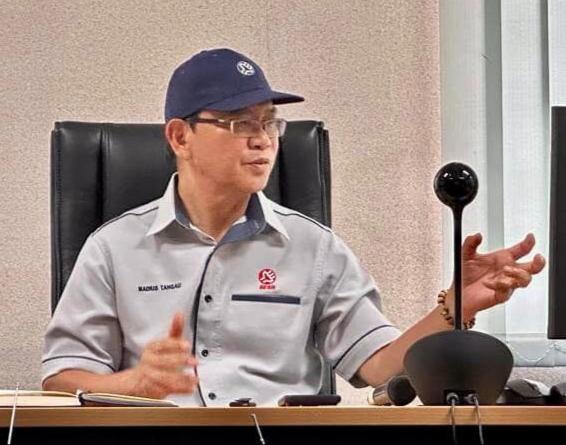KOTA KINABALU: Sabah Electricity Sdn Bhd (SESB) must own the capacity to generate at least 70% of Sabah’s baseload power requirements before the state can seriously move towards renewable energy.
SESB’s Chairman Datuk Seri Panglima Wilfred Madius Tangau said, the baseload power demand in Sabah is at 1,080MW and the maximum power demand is about 1,200MW which means that the state reserve margin is less than 12%.
“Obviously, this situation cannot ensure a stable power supply as the surplus supply is insufficient to cover technical problems, thus the frequent power disruptions in the state.
“We must first solve the power disruption problem first. To do this, SESB must own at least 70% of the baseload power generation (about 700MW) and must generate its own electricity because we need to have control.
“Currently, SESB is only generating and owning 20% of this while the rest are purchased from independent power producers (IPP),” he said.
Tangau explained that baseload is the minimum level of power demand system that must be dependable enough to meet the 24-hour demand consistently. Only when the baseload generation is stable that Sabah can be ready to start venturing into renewable energy.
The Tuaran MP said since 80% of power supply in Sabah is generated by IPP, SESB’s hands are tied in many matters relating to power generation in the state.
“For example, when a certain IPP suddenly wants to do scheduled maintenance, and when an IPP does not supply the amount of electricity as agreed, there is not much we can do. In that instance load shedding is unavoidable. This explains the frequent power disruption (in Sabah),” he explained. It is the right time after 25 years of privatization of SESB from Sabah Electricity Board (SEB) to look at why we are still experiencing load shedding.
As such, he said, SESB hoped for the government to place confidence and trust in SESB so that it would be able to generate its own electricity without depending on IPP. For now, stakeholders see SESB as mere off takers of power generation. All the stakeholders need to relook at the SESB financial sustainability and or stability of the electricity power supply.
“Don’t think that SESB is only capable of purchasing power from IPP to be sold to the consumers; SESB owned the transmission and distribution but not the generation assets. We are served by skilled manpower to conduct studies and run its own projects for power generation in Sabah.
“It has been a long-standing problem that has happened for decades; We (SESB) are not given the opportunity to operate (the power pants) even when SESB was the one who conducted studies for projects such as the Ulu Padas Dam, Liwagu Dam and a coal power plant in Lahad Datu.
“At the end of the day the project is either cancelled or given to others to implement and operate,” he said.
“This is a far cry from that of Sarawak Energy Berhad (SEB) where they owned all the power generation plant. There is no IPP in Sarawak.”
He pointed out the example that SESB had spent RM33 million to conduct a feasibility study on the Ulu Padas Hydroelectric Dam but was not given the trust to implement the project.
The proposed Lahad Datu coal power plant which could have generated 300 MW of electricity also ended up cancelled due to parties clamouring who will own the plants, he said.
Tangau had recently held dialogue sessions with state and federal level people’s representatives in Sabah in the hope of getting them to be united in empowering SESB to make decisions for power generation projects in the future.
“Their responses have been very positive so far. All of them support SESB. Moving forward, when SESB proposes a project, we hope to get support from all the parties as well as the government,” he said.
Tangau added that SESB is currently operating at a loss, because power purchased from IPP is at RM0.43 per unit electricity but sold to consumers at RM0.34 per unit in accordance with the tariff set by the federal government. The electricity tarif at the peninsular is RM0.39 per unit electricity.
“SESB is currently facing a real problem – financial sustainability,” he added.
Meanwhile, Tangau who is former Minister of Science, Technology and Innovation as well as the former Minister for Industrial Development, Sabah, said he also hoped Petronas and the Sabah government would prioritise the electricity generation when it comes to natural gas distribution.
“If all the gas resources are given to the industrial sector, and none to power generation, then how are the industries going to operate without an electricity supply? So please prioritise electricity generation first,” he said.


